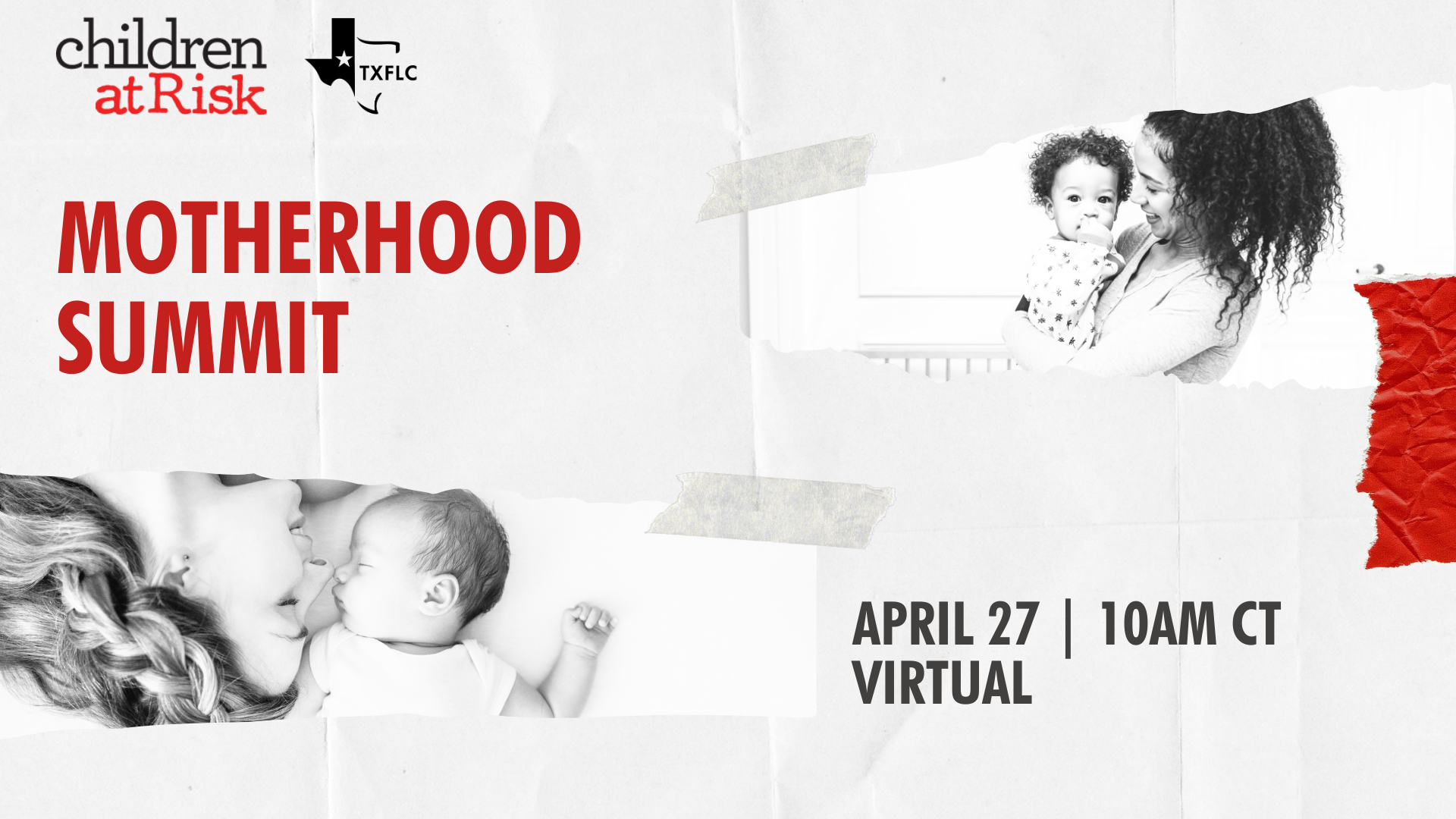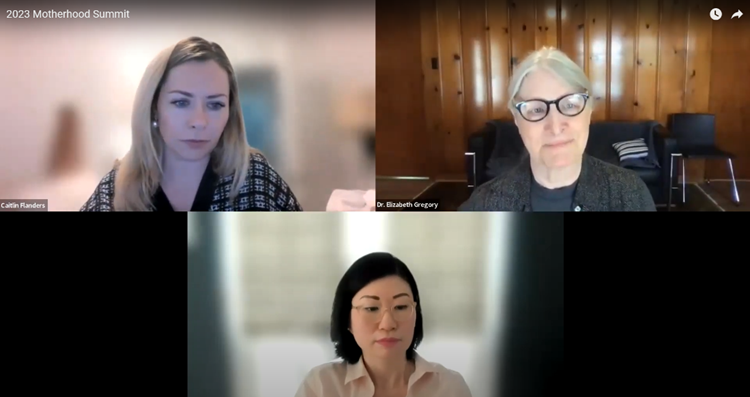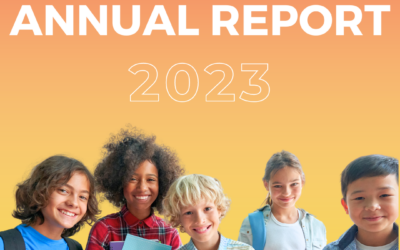
Last month, the Texas Family Leadership Council and CHILDREN AT RISK hosted the second annual Motherhood Summit. The summit explored some of the most pressing issues facing Texas mothers and how these issues affect not just themselves, but their children and families as well.
Dr. Elizabeth Gregory, Taylor Professor and Director of the Institute for Research on Women and Gender and Sexuality at the University of Houston, kicked off the event. She talked about how the experience of Texas motherhood has fundamentally changed due to recent policy changes in the state, leading to a lack of support for women and a major impact on their families. She mentioned, “It’s time to have a dialogue about who it is exactly who thinks putting female citizens in so little control over the course of their own lives and at such risk is a good idea”. Unfortunately, “OBGYN and OBGYN residents are leaving the state, leaving limited resources for the women in Texas”. Oftentimes, “fertility politics sacrifice real families’ wellbeing”. Texas also ranks low in wages for women, creating an additional burden on mothers and families in the state. In Houston, “full–time working Hispanic women make 37 cents on the dollar. Black women make 45 cents on the dollar, Asian women make 63 cents on the dollar, and White women make 70 cents on the dollar; this is lower than the national norm in all groups”. This affects their family including their kids and partners. Dr. Gregory also touched on limitations many mothers face regarding access to quality education based on the location; limited access to childcare due to childcare deserts or high cost of childcare; as well as a high risk of being in abusive relationships. “IPV homicides doubled between 2019-2022in Houston rising doubled from 22 to 64.” It is important to bring awareness to the blight of domestic violence as “connecting the dots and naming them is key”, said Gregory.
Q&A with Katherine Strandberg, Dr. Robin Page, and Dr. Elizabeth Gregory
Section One: Family Planning
Katherine Strandberg, Policy Director at Every Body Texas, presented on family planning. “There are 1.9 million women of reproductive age in the state of Texas who rely on publicly funded family planning services in order to access prenatal care, cervical cancer screenings, STI testing and treatment, and birth control.” She touched on three publicly funded reproductive healthcare options in Texas beyond Medicaid. These include Healthy Texas Women, which is the largest planning safety net program in the state; The Family Planning Program serves both women and men to help but has limited funding; and Title X, which “focused on ensuring that anyone and everyone in the country can access high quality reproductive and family planning healthcare regardless of their hometown or income.” She explained the eligibility for each program and provided more information about the benefits they cover. As a takeaway, she urged attendees to, “call your senator’s office and tell them that you support HB 12 – a full year of coverage for new moms.”
Section Two: Access & Care Disparity
Dr. Theresa Morris, Professor of Sociology and Coordinator of the Women’s and Gender Studies Program at Texas A&M University, presented on access & care disparity. She started by talking about the social determinants of health, which are the non-medical factors that influence health outcomes. They play a big role in maternal health and maternal health access. Dr. Morris focused on the reproductive justice framework, which argues “the right to decide if and when to have children and the right to raise them in a safe and healthy environment is a human right.” She then introduced the Maternal Vulnerability Index. The Index examines the determinants of maternal health to identify where in the US moms are most vulnerable to poor pregnancy outcomes. She reviewed the 6 factors that the vulnerability index touches on. These factors include reproductive healthcare, physical health, mental health, substance abuse, general healthcare, socioeconomic determinants, and physical environment. Dr. Morris mentioned that “Rural areas, the South, and the Midwest have particularly high concentrations of counties where pregnant women and mothers are exposed to harmful community conditions”. Indexes like these are important to have because “Until you know where the problems are – where the vulnerabilities are by geography – it’s hard to design interventions”. She continued, “We need to value the lives of women. We need to value the health of women. Regarding maternal health, “We need to expand health access coverage and ensure that women on Medicaid have access to healthcare for at least a year after they give birth.”
Section Three: Maternal Mortality
Dr. Robin Page, Ph.D., APRN, CNM, FACNM, Director of the Program of Excellence for Mothers, Children, and Families at Texas A&M University of Nursing, presented on maternal mortality. She also serves in the statewide Maternal Morbidity and Mortality review committee where she is the certified nurse midwife representative on the committee. Dr. Page talked about how poor maternal health in Texas is also a crisis for children. “Data from the statewide maternal morbidity and mortality review committee report released in December 2022, states that ‘the 118 pregnancy-associated death cases reviews during the particular cohort, resulted in 6,162 years of potential life lost by the women who died and left an estimated 184 living children who will forever be impacted by the life of their mothers. When it comes to maternal mortality, “In many of the deaths that are occurring within the 1-year period, social Determinants of health are big drivers of that.” Regarding racial disparities, “Black women in Texas have twice the ratio and four times that of Hispanic women when it comes to maternal mortality,” and, unfortunately, the racial disparities are getting worse each year. She concluded the presentation with solutions including the importance of training and education for more doulas, Certified Professional Midwives, and Certified Nurse Midwives. Texas Research to Policy Collaborative recently released reports on some solutions regarding the maternal care workforce for doula services and maternal and child health. She provided information on an initiative that explores the association between intimate partner violence (IPV) and substance use disorder (SUD) during pregnancy. This is important to develop and pilot educational programs to train pregnancy and post-partum providers on SUD treatment and IPV. Other recommendations for Nurse-Family Partnership that provides home visiting programs, working on the health care shortage, and expanding Medicaid to 12 months post-partum.

Q&A with Caitlin Flanders, Elizabeth Krause, and Dr. Elizabeth Gregory
Section Four: Postpartum Healthcare
Caitlin Flanders, Director of Public Affairs at Texas Medical Association, presented section Four which focused on postpartum healthcare. Texas has the highest rate in the US of uninsured women – with about 26% of Texas women of childbearing age being uninsured. She also provided a legislative update on HB 12 to extend Medicaid to better support moms and babies. Flanders mentioned, “It’s important that kids who are still eligible for Medicaid insurance can stay enrolled and keep seeing their doctor”. One of the goals of the agency is for kids and new moms who are no longer eligible for Medicaid can smoothly transition to CHIP, Healthy Texas Women, or Marketplace insurance. They are working with policymakers to best ensure that. Some ways that people can help are “Utilize your events to raise awareness about the end of the continuous coverage, invest in local organizations that do outreach and application assistance for children and families, and support health providers that serve pregnant and post-partum Texans”.
Section Five: Maternal Mental Health
Elizabeth Krause, ScM, Director of Programs at the Perigee Fund, presented on maternal mental health. She spoke about how perinatal mental health issues are the most common complication of pregnancy, not something very well understood and often seen as an invisible issue. “Estimates are up to one in five of all perinatal people experience a maternal mental health issue…most commonly the baby blues, perinatal depression or anxiety disorder, post-partum depression, birth trauma”. There are treatments and early identification for the most common perinatal mood and anxiety disorders. There are evidence-based prevention models to lean on. “The challenge is the mismatch between the solutions we already have in the toolkit and our ability to get those tools and interventions to the moms when they need them, where they need them.” A study showed that only “30% of the post-partum depression was identified in a clinical setting and only 16% received any treatment (even minimally effective), 6 % received adequate treatment, and 3% achieved complete remission of symptoms”. This is unacceptable when we know how to treat this. Multiple social factors also play a role in mental health.
She focused on how maternal mental health is a birth inequity issue and provided examples. Her final point was about how mental health is a two-gen issue; we can’t have healthy children without healthy parents or caregivers. She recommends “Investing and addressing maternal health yields great returns because the benefits spread across two generations.” You can read the Perigree Fund’s report on maternal mental health here.
WATCH THE RECORDING
This summit is presented in partnership with the Texas Family Leadership Council (TXFLC), the Texas Racial Equity Collaborative (TREC), Every Body Texas, United Way for Greater Austin, Santa Maria Hostel, the Early Learning Alliance, the Bay Area Houston Alumnae Chapter of Delta Sigma Theta Sorority, Inc., Molina Healthcare, Head Start Greater Dallas, Texas Women’s Healthcare Coalition, United Way of Southern Cameron County, Methodist Healthcare Ministries, Children’s Defense Fund Texas, Texas A&M University School of Nursing, and the March of Dimes.
To learn more about the Texas Family Leadership Council and our collaborative working groups, visit childrenatrisk.org/txflc/
Have questions about joining us as a sponsor or partner on an upcoming Learning Event? Reach out to Courtney at cmattox@childrentatrisk.org
MORE LIKE THIS
Recap | 2024 Texas Equity Tour
Written by Ashley Watts, Texas Racial Equity Collaborative (TREC) Doctoral Fellow and Briauna Derry, Associate Director of Media Activism. In 2021, the Texas Racial Equity Collaborative (TREC) first gathered, united in their belief that working together could bring...
2024 C@R Special Events
Special Eventsconvening for change Every dollar donated helps us improve the lives of Texas children. CHILDREN AT RISK is a 501(c)(3) non-profit organization (EIN: 76-0360533). Contributions are tax-deductible to the fullest extent allowed by law. It is with immense...
2023 Annual Report
It is with immense pride and joy that we announce the start of a significant milestone: the 35th Anniversary of CHILDREN AT RISK. For over three decades, our organization has been at the forefront of advocating for the well-being and rights of vulnerable children,...
2024 Equity Tour
The Texas Equity Tour, slated for March and April 2024, is a pivotal event organized by CHILDREN AT RISK (C@R) to address systemic racism and its impact on Texas children and families. Rooted in the principles of racial equity, the tour serves as a platform to present...
2024 C@R Learning Events
Learning Eventsconvening for change CHILDREN AT RISK is committed to hosting free events that engage the public and help them drive change for children. We aim to share research, unpack pressing policy issues, and highlight diverse community perspectives from across...



